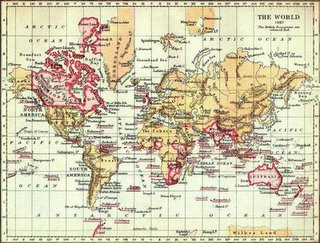Mark Steyn lauds the largely salutary influence of the British Empire on many of the key players on the world stage: Pip, pip for the Brits — despite the blips. To which I say, yes, but. . . .

It is difficult nowadays to get people to admit that there might have been something good about the rule of a European colonial power. Ironically, Karl Marx thought that the consolidation of much of the world under a very few imperial powers was a progressive historical development, something almost entirely forgotten by his latter day followers. More than a century later we are wont to associate imperialism with exploitation of peripheral territories to enrich the mother country. In reality, of course, imperialism drained the resources of the metropolitan centre, which explains why Britain, France and others were so anxious to divest themselves of their holdings after the end of the Second World War.
So let's tally up the score. On the plus side, British-derived political institutions have been extraordinarily enduring and have lent to a number of former British territories — though by no means all — an enviable stability not to be taken for granted. I myself was born in such a country, am currently living in another such country, and recently returned from visiting yet a third. To be sure, Anglo-Saxons cannot rival the French or Italians for their cuisine, the Russians for their literature and music, or the Germans for their philosophy. Nevertheless, those of us living in Anglo-Saxon countries are generally able to enjoy all of these imported achievements — plus the rule of law, guaranteed personal liberty, and — to quote the Constitution Act, 1867 — peace, order and good government. This is very nearly the best of all possible worlds.
Steyn could have bolstered his case further by comparing Cyprus, a British possession for 82 years, with Greece, the latter of which has suffered under a series of interfering monarchs, overreaching nationalist governments, military dictatorships, and a weak sense of personal freedoms, including religious liberty. By contrast, Cyprus — at least the southern part of the island under the internationally recognized government — appears clean and efficient, with an excellent transportation and communication infrastructure. The people are unfailingly courteous and helpful. The greater prosperity of the island is achieved by an enterprising populace capable of bouncing back after the tragedy of invasion and partition. In Transparency International's recently released Corruption Perceptions Index Survey, Cyprus outscored Greece by 10 points.
On the minus side, however, Cyprus also weakens Steyn's case to no small degree. For decades Britain refused to reconsider Cyprus' status, deliberately defying the political aspirations of its people. During the emergency of the late 1950s, Britain employed a divide and rule tactic that ended up poisoning relations between the Greek and Turkish communities in the island, leading to the troubles of 1963-4, 1967 and 1974.
At the same time, it is true that Britain's Labour government offered Cyprus self-government short of full independence in 1948 — an offer that Cypriots, encouraged by an Orthodox Church in the dark grip of hellenic nationalism, unwisely declined. Yet in 1960, Britain, along with Greece and Turkey proper, imposed an unwieldy constitutional document on the people of Cyprus that took little account of pre-existing traditions of intercommunal co-operation in the island. And, of course, when Turkey invaded the north in 1974, Britain's presence in the form of its sovereign military bases did nothing to stop this.
If Britain could have bequeathed one more thing to the Greek Cypriot political culture, it should have been this: a willingness to accept the proverbial half a loaf rather than to insist on the whole and end up with nothing. Anglo-Saxons are skilled in the art of compromise. Sad to say, Greek Cypriots are much less so — which explains in no small measure why the political stalemate in the island is currently in its 32nd year.
No comments:
Post a Comment